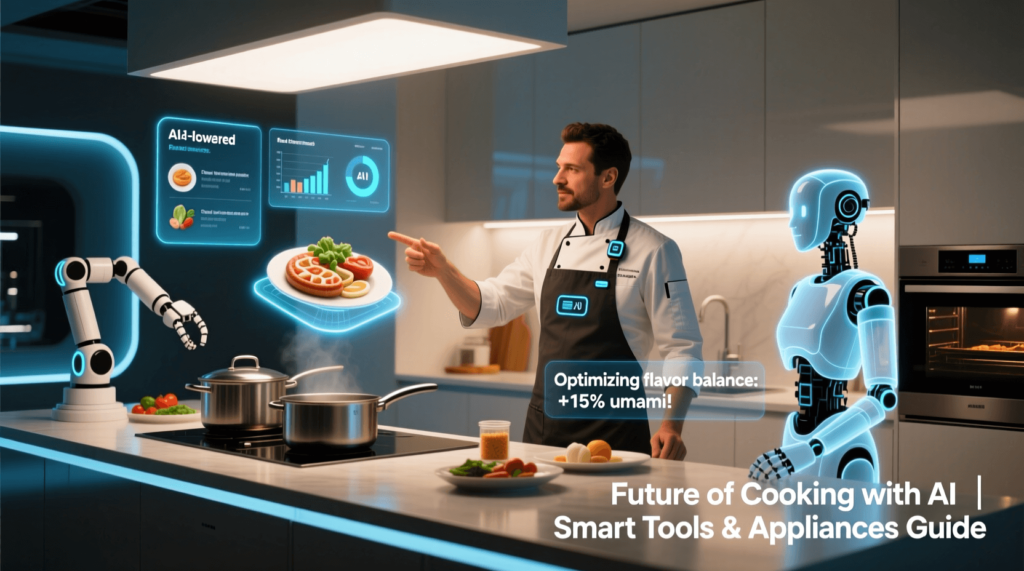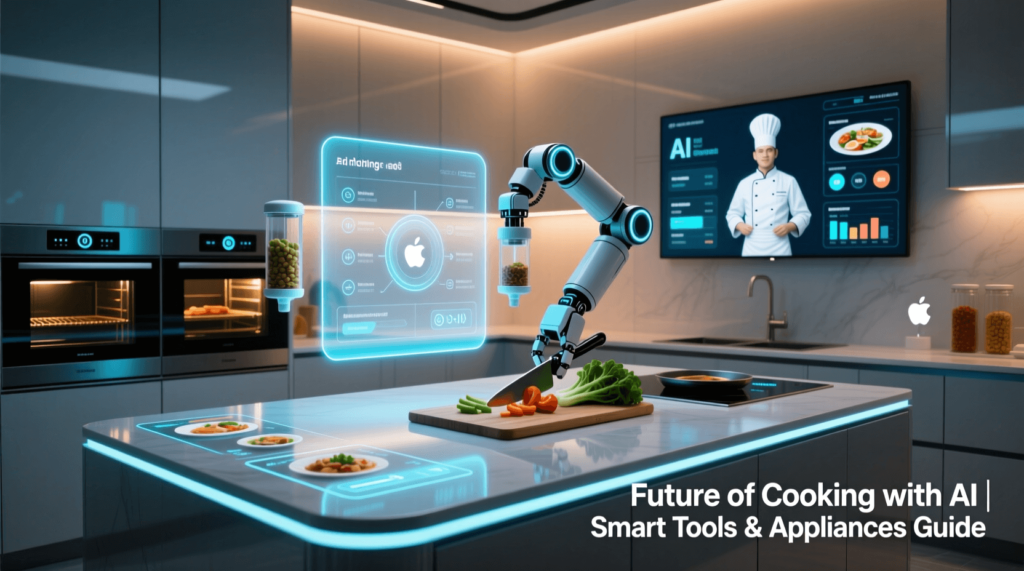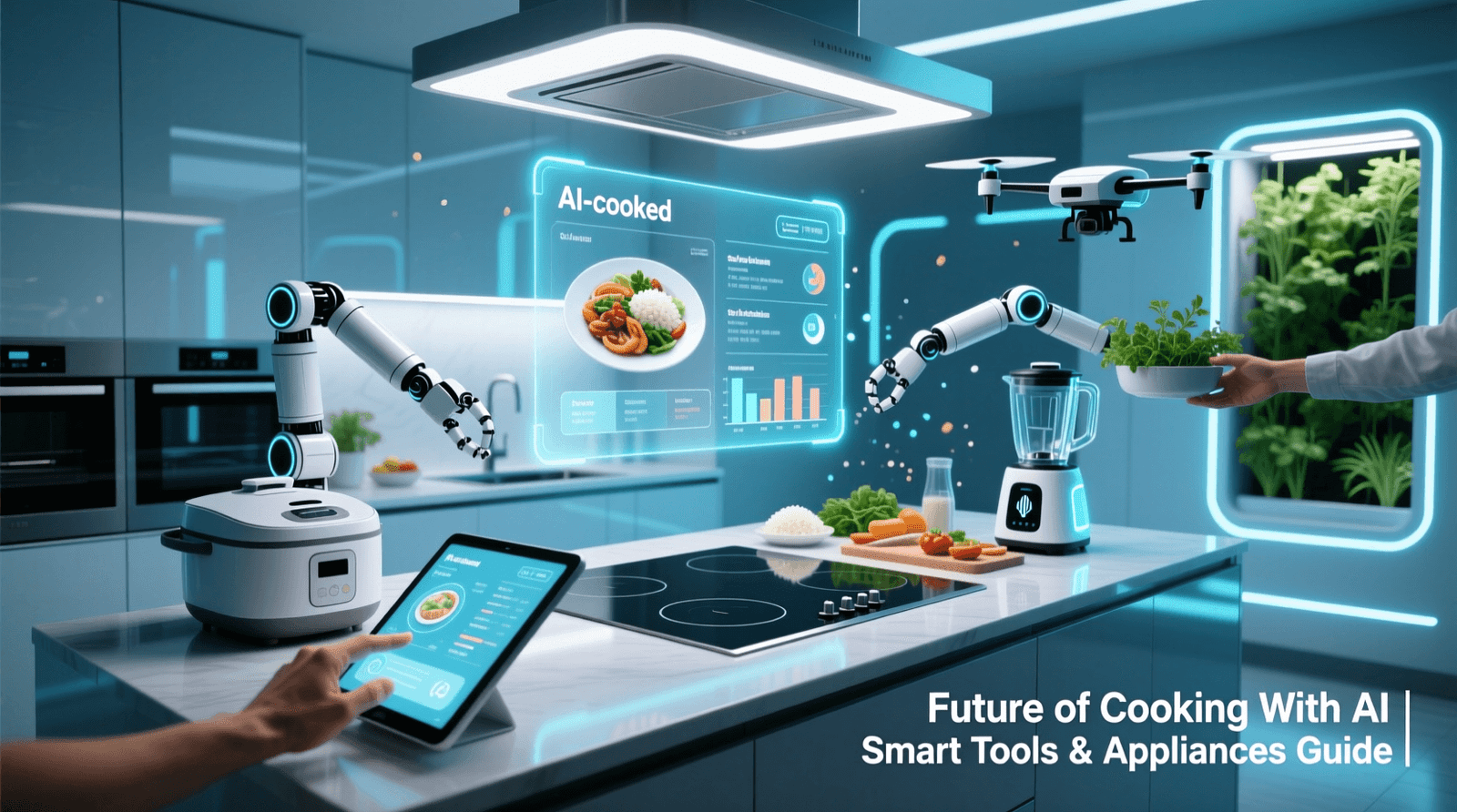Artificial Intelligence (AI) is no longer just a futuristic concept—it has already made its way into our homes and kitchens. With the rise of AI tools for cooking, people are discovering new, smarter, and more convenient ways to prepare meals. From recipe suggestions and personalized diet plans to voice-guided cooking assistants and even AI-powered smart ovens, this technology is changing the way we approach food.
In this article, we will explore how AI is transforming cooking, its benefits, the best AI cooking tools available, and how these innovations are shaping the future of kitchens worldwide.
What is an AI Tool for Cooking?
An AI tool for cooking is a software or device that uses artificial intelligence to assist users in preparing meals. These tools leverage machine learning, natural language processing (NLP), and predictive algorithms to provide recipe recommendations, automate cooking processes, or even create entirely new dishes based on available ingredients.
For example, some apps can analyze what you have in your fridge and instantly suggest recipes, while others control smart appliances like ovens or air fryers to ensure your meals are cooked perfectly.
The Rise of AI in the Kitchen
The adoption of AI cooking tools is growing rapidly because of their ability to save time, reduce food waste, and make cooking easier for beginners. With more people working from home and seeking healthier eating habits, AI offers personalized meal planning and nutrition guidance.
Smart devices like Amazon Alexa, Google Home, and even AI-powered microwaves are already integrated into millions of kitchens. As technology advances, these tools will become even more intelligent, predicting preferences, tracking nutrition, and automating entire cooking routines.
Key Features of AI Tools for Cooking
AI-powered cooking tools come with a variety of features that make them appealing to both beginners and professional chefs:
- Recipe Recommendations – AI suggests recipes based on available ingredients, preferences, and dietary restrictions.
- Personalized Meal Plans – Tools analyze your health goals and create customized diet plans.
- Smart Cooking Assistance – Voice-guided step-by-step instructions help avoid mistakes.
- Food Recognition – Some apps use image recognition to identify ingredients.
- Cooking Automation – Smart appliances adjust temperature and timing automatically.
- Nutritional Tracking – AI calculates calories, macros, and nutrients in real-time.
- Waste Reduction – Suggests recipes using leftovers to prevent food waste.
Benefits of Using AI in Cooking
Using AI in the kitchen offers multiple advantages, making it a valuable addition for households:
- Saves Time: Quickly find recipes without searching for hours.
- Encourages Healthy Eating: Personalized diet suggestions support nutrition goals.
- Minimizes Food Waste: AI creates recipes based on what’s already at home.
- Boosts Cooking Confidence: Guided instructions reduce errors.
- Supports Busy Lifestyles: AI meal planning helps families save effort.

Popular AI Tools for Cooking
Several AI tools and apps are leading the way in transforming kitchens. Here are some of the most popular:
1. Whisk
An AI-powered recipe app that helps with meal planning, shopping lists, and smart cooking.
2. Plant Jammer
Uses AI to suggest recipes from available ingredients, perfect for reducing food waste.
3. Yummly
Personalized recipe recommendations based on your preferences and health goals.
4. Chef Watson by IBM
An advanced AI that creates unique and innovative recipes using ingredient combinations.
5. Suvie Smart Cooker
A smart kitchen appliance powered by AI that automates cooking by controlling temperature and timing.
AI Cooking Tools and Health
One of the biggest advantages of AI cooking technology is its impact on health and nutrition. By analyzing eating habits and health data, AI tools can:
- Recommend balanced meals.
- Suggest portion sizes.
- Track calorie intake.
- Support specific diets like keto, vegan, or gluten-free.
This personalized approach ensures that users not only enjoy tasty meals but also make healthier food choices.
How AI Reduces Food Waste
Food waste is a global issue, and AI plays a major role in solving it. By analyzing what ingredients are about to expire, AI suggests creative ways to use them. For instance, apps like Plant Jammer help users combine leftover vegetables into soups, stews, or stir-fries. This not only saves money but also contributes to sustainability.
Smart Appliances Powered by AI
Beyond apps, many kitchen appliances are now equipped with AI technology. Examples include:
- AI Ovens: Adjust cooking modes and temperatures automatically.
- Smart Refrigerators: Track food expiration dates and suggest recipes.
- AI Coffee Makers: Learn your preferences and prepare coffee just the way you like it.
- Robotic Kitchen Assistants: Devices that can chop, stir, and even cook meals for you.
These appliances transform the kitchen into a fully automated cooking space, making cooking effortless.

The Future of AI in Cooking
The future of AI in cooking looks promising. With advancements in robotics, machine learning, and IoT (Internet of Things), kitchens will become even smarter. Imagine an AI tool that:
- Orders groceries automatically when stocks run low.
- Suggests meals based on your health condition.
- Controls robotic arms to prepare meals entirely on their own.
- Connects with wearable health devices to ensure meals match your fitness goals.
This future is not far away, as companies are already testing prototypes of robotic chefs and fully automated smart kitchens.
Challenges of AI in Cooking
Despite its benefits, AI in cooking faces some challenges:
- High Costs: Smart appliances and premium apps can be expensive.
- Data Privacy: Health and dietary data collection raises privacy concerns.
- Technology Dependence: Overreliance may reduce traditional cooking skills.
- Limited Creativity: AI may struggle to match the creativity of human chefs.
Tips for Choosing the Best AI Cooking Tool
When selecting an AI cooking tool, consider:
- Compatibility with your devices and appliances.
- Customization options for dietary needs.
- Ease of use with intuitive interfaces.
- Cost-effectiveness compared to manual methods.
- User reviews for reliability and accuracy.
Conclusion
AI tools for cooking are revolutionizing kitchens worldwide by making meal preparation faster, healthier, and smarter. From apps that recommend recipes to smart appliances that automate cooking, AI is reshaping how we think about food. While challenges like cost and privacy remain, the benefits far outweigh the drawbacks.
As technology continues to evolve, the future kitchen will be one where AI plays the role of a personal chef, nutritionist, and assistant all in one. Embracing AI cooking tools today can help you save time, reduce waste, eat healthier, and enjoy cooking like never before.




